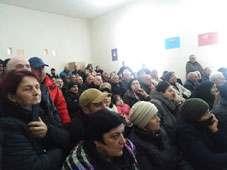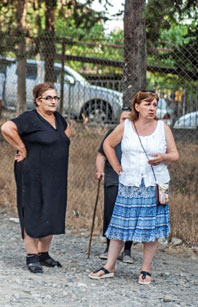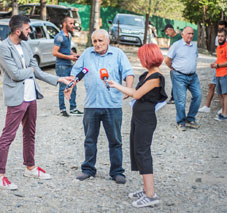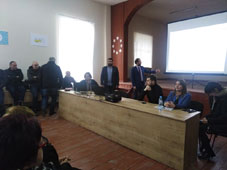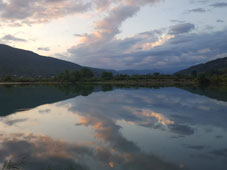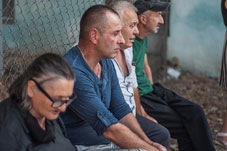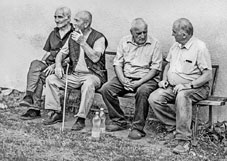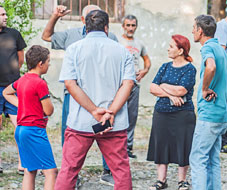
CHOPORTI RAISES QUESTIONS FOR ALL OF GEORGIA
Thursday, July 30
The news filtered into the village like sun through the vine leaves on balconies and in the fields: “Have you heard?” Was this one of the long-discussed highway projects that had been rumored for years, and how will it impact each of us? Would the 4-lane highway run over traditional lands and homes? Would it destroy the forests and wetlands of the Aragvi River, including the lake-reservoirs of Tbilisi’s drinking water that had been so carefully monitored and protected for almost a century? The questions multiplied until February 2020, when a meeting was called at the Choporti public hall to discuss the planned four-lane highway to connect Natakhtari to Jinvali by crossing through Choporti, Abanoshkhevi, Bulachauri and Kubriantkari.
The Italian company Anas came to the packed meeting to announce their intentions, villagers came to have concrete answers at last. They listened and questioned the presentation with growing alarm. Leaving the meeting, local Choporti citizens assessed the presentation as a big joke; they were frustrated at the vagueness of responses to valid questions and the disrespectful attitude of the authorities, especially the representative from Anas, who vaunted northern Italian industrialization as “being due to our great highway systems”, while carefully avoiding mention of the Genoa bridge tragedy or other questionable construction fiascos that Anas is implicated in.*) He implied that Georgia would remain ‘backwards’ until super-highways ‘save’ the country.
At the same time, another peril was threatening—the viral pandemic; later it would be difficult to hold community meetings, meaning it would be hard to learn more about the plans being made by the Asian Development Bank, Anas Italy, and the Government of Georgia. (The national Government has used the pandemic as a reason to move forward with this project without going through the mandatory public hearing by the Ministry of Environment.)
Choporti is one of the first villages after Kartli, in the Dusheti district of the Mskheta-Mtianeti region, on the ‘military road’ built in the time of Katherine the Great. The region has sometimes been seen as one of Georgia’s poorest, yet proud and traditional—many emigrated from Georgia, working to improve the lives of those back home, then returned from Europe, the US and elsewhere after studying or working, to develop their village.
Choporti also has cause for fame and excellence. At the mention of the village’s name, Georgians’ immediate response is “Wow, tomatoes!” The pale red, juicy “Choportula tomato”, developed in Soviet times, gained fame well beyond its borders. Today villagers proudly grow these and other crops and credit the pure water and air of their region. Most have crops and livestock that they raise for most of what they need. It is a modern example of a subsistence economy, and reflected in the EU common agricultural policy (CAP) that combines “social, economic, and environmental approaches on the path towards achieving a sustainable system of agriculture in the EU”. Unfortunately, the proposed highway project has not carried out a professional economic impact assessment.
By no means isolated, however, Choporti has direct, regular public transport connecting to Tbilisi. Locals swim in nearby lakes and streams; they fish and hike near the famous Aragvi River that descends from near Pasanauri north of Choporti. Without the schism of rich and poor found in Georgia’s urban areas, solidarity is strong. In Soviet times, Choporti had already shown its sense of identity when it successfully refused a planned railway through the area.
Today villagers stand with determination to clarify questions such as why one of the more feasible alternative routes be used; a recent meeting on 26 July showed how impassioned people are to preserve the lakesides and water catchment areas, their school and the village’s integrity. The project would bring 24-hour noise and diesel pollution, traffic danger and destruction to both domestic animals and wildlife, the school and neighborhoods. Serious geological and hydrological studies have not been carried out for massive high-vibration and noise pollution. (Neighboring Bulachauri, famous for its oldest traditional village restaurant, dating from before Perestroika, would be slashed into two parts. However, villagers there are still not informed, and becoming alarmed.)
In early May, Choporti formed a citizens’ group and later wrote, requesting the highway route to be changed to suggested alternatives, addressed to both the ADB and Georgia’s Prime Minister, but has received no answers. The direst aspect of this project is the lack of transparency, no democratic processes and unclear motivations—both financial and geo-political. There has been little or no information made available to those most concerned, and no nation-wide or local democratic consultation process.
What does this matter to the capital, Tbilisi? All Georgia is affected. Besides the fact that a four-lane transport highway, unregulated as to hours or days of operation, will bring important challenges around types of cargo entering the country, the most urgent for Tbilisi is their vital strategic natural resource: water. Choporti’s reservoirs ensure clean water supplies for Tbilisi and for some villages without their own sources (for example, Saguramo). Heavy diesel fuels and accidental spills will threaten the whole Aragvi water system for millions of Georgians. (Indeed, the outdated, polluting, super-highway transport systems runs counter to the direction other European countries are signing on to, such as the European Green Deal.)
Beyond the social, environmental and economic issues of Choporti and the three other surrounding villages, central government’s silence has caused rumors to swirl, while the topic gets wider, national attention. A comment heard was that this seems to cater to Russian development more than local Georgian populations. It seemed to be “a slap in our country’s face, especially since Russia already occupies more than 20% of Georgian territory”. This Natakhtari-Jinvali section is a part of the large scale highway to Russia that aims to turn Georgia into a transit country through the North-South corridor project.
Meantime, even though keeping updated on national and international issues, local citizens continue to face serious challenges during the pandemic, including education and health. They are most concerned about their land plots, their crops, and harvests on their way. The marvelous cloud formations over the surrounding hills, the clean air and a view of Mt. Kazbegi on a clear day give the village a solid sense of permanency that local citizens are determined to keep.
M.E.Chatwin/photos: N. Khundadze
*) “There are about twenty badly-damaged motorway bridges in Italy currently under investigation. There are also 200 illegal tunnels that don't comply with European standards.” EuroNews, Feb 2020.
